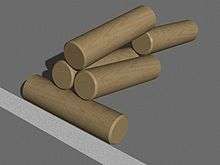Gorodki
Gorodki (Russian: Городки, townlets; Swedish: Poppi) is an ancient Russian folk sport whose popularity has spread to Karelia, Finland, Sweden, Ingria, Lithuania, and Estonia. Similar in concept to bowling and also somewhat to horseshoes, the aim of the game is to knock out groups of skittles arranged in various patterns by throwing a bat at them. The skittles, or pins, are called gorodki (literally little cities or townlets), and the square zone in which they are arranged is called the gorod (city).

.jpg)
In Scandinavian and Baltic languages, the game has many different names, such as kurnimäng, kriuhka, köllöi, keili, and miestučiai. The Finnish variant is called kyykkä, or Finnish skittles.
The game is mentioned in the Old Russian Chronicles and was known in a form that is quite close to the modern one at least from the 17th century, since one of the famous gorodki players was young Peter I of Russia.[1]
Gameplay
The game consists of throwing a bat from a predetermined distance at the gorodki, which are arranged in one of 15 configurations: cannon (пушка, pushka), fork (вилка, vilka), star (звезда, zvezda), arrow (стрела, strela), well (колодец, kolodets), crankshaft (коленчатый вал, kolenchatyy val), artillery (артиллерия, artilleriya), racquet (ракетка, raketka), machine gun installation (пулемётное гнездо, pulemyotnoe gnezdo), lobster (рак, rak), watchmen (часовые, chasovye), sickle (серп, serp), shooting gallery (тир, tir), airplane (самолёт, samolet), and letter (письмо, pis'mo).
The goal is to completely knock the gorodki out of a marked square using the fewest possible number of throws.
 Cannon
Cannon Fork
Fork Star
Star Arrow
Arrow Well
Well Crankshaft
Crankshaft Artillery
Artillery Racquet
Racquet Machine gun installation
Machine gun installation Lobster
Lobster Watchmen
Watchmen Sickle
Sickle Shooting gallery
Shooting gallery Airplane
Airplane Letter
Letter

History
Although traditionally Gorodki is a folk game, it was played by such Russian historical figures as emperor Peter I, Generalissimus Alexander Suvorov, Vladimir Lenin, and Joseph Stalin, as well as cultural luminaries like Ivan Pavlov, Leo Tolstoy, Maksim Gorky, Nikolay Timofeev-Ressovsky, and others.[2] The game as it existed prior to 1923 had no rules per se. It was organized into a legitimate sport and its rules codified in 1923, when the first All-Soviet-Union competition was held, and it became an event at the first All-Union Olympiad in 1928.[2]
Popular culture
The game was shown in an episode of the Soviet animated series Nu, pogodi!. Additionally, Gorodki was featured in the popular CBS reality show The Amazing Race 17, episode 7, during a Roadblock challenge. The game was also featured on Schlag den Raab on 4 June 2011, and was a favorite childhood pastime of the eponymous protagonist of the novel Pnin by Vladimir Nabokov (p. 106, Vintage). The game can be played on the Wii game system through the game disc REC ROOM released in 2009.
See also
References
| Wikimedia Commons has media related to Gorodki. |
- The history of gorodki at gorodki.org (in Russian)
- "Gorodki.com.ru". Archived from the original on 2007-09-27. Retrieved 2007-08-10.